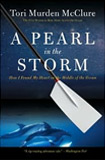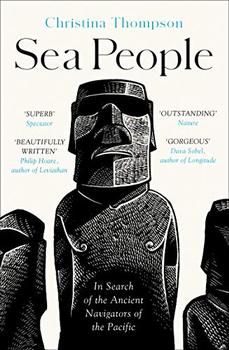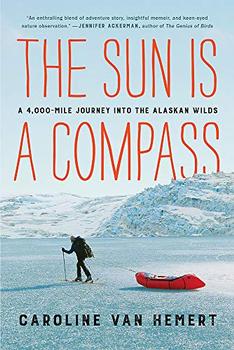Summary | Excerpt | Reading Guide | Reviews | Beyond the book | Read-Alikes | Genres & Themes | Author Bio

How I Found My Heart in the Middle of the Ocean
by Tori Murden McClure A series of hurricanes severely injured Tori McClure and kept her from completing her first attempt to row the Atlantic. A year later, McClure spent 81 days at sea rowing 3,333 miles to achieve the first successful Atlantic crossing for a woman. Her memoir, A Pearl in the Storm, transports the reader to the world of these ocean crossings, their unrelenting solitude, severe beauty, and tortuous pain. McClure shows us that the journey of one small person across a vast and treacherous ocean can enlarge our sense of what it means to be human, and can inspire us to be the best that we can possibly be.
A series of hurricanes severely injured Tori McClure and kept her from completing her first attempt to row the Atlantic. A year later, McClure spent 81 days at sea rowing 3,333 miles to achieve the first successful Atlantic crossing for a woman. Her memoir, A Pearl in the Storm, transports the reader to the world of these ocean crossings, their unrelenting solitude, severe beauty, and tortuous pain. McClure shows us that the journey of one small person across a vast and treacherous ocean can enlarge our sense of what it means to be human, and can inspire us to be the best that we can possibly be.
McClure's childhood memories center on her successes and failures to protect a mentally-disabled brother from the taunts and vicious attacks of children at school and in her neighborhood. Eventually McClure's academic achievements and athletic talent carry her away from her brother and her home to an elite all-girl private school, and then to Smith College and Harvard Divinity School. Always tough, strong-willed and ambitious, McClure meets challenge after academic challenge (she completed the 4-year Harvard Divinity school program in 3 years) while showing great prowess as a rower. As if success as a student and an athlete weren't enough, McClure commits herself to serving humanity by working with the homeless, the dying, the sick, the helpless, the poor, and the drug addicted.
A student of religion, American history, Greek tragedy and Shakespeare, McClure is a loner, passionate about humanity and an athlete seeking ever-greater challenges in nature. The "theology of adventure" becomes the focus of her Divinity School master's thesis and for research she joins an expedition and skis across Antarctica:
The wind blows north off the polar plateau toward the ocean, so we were always skiing into the wind. It was a wind like pounding surf. Sometimes it blew seventy miles an hour. It could reduce us to crawling things. We had to shout to be heard only a few feet away.
On January 17, 1989, the other expedition members and I became the first Americans... and the first women... in history to reach the South Pole by an overland route.
McClure graduates from Harvard Divinity School having developed a code of living derived from her experiences in the wild,
We carry very little, so we learn to use the tools we have at hand. We persevere over difficult terrain, and we make peace with uncertainty. Within the expedition team, success and failure are shared experiences. The summit is sweeter when no one is left behind.
Yet I wondered throughout why McClure was driven to row solo across the Atlantic in a 23-foot plywood boat. While recalling a violent storm and a rowboat half-submerged, McClure offers the following explanation:
As the water leaks into my cabin back here, I've been thinking a lot about "What if the camera is found and I'm not?" Now "Why did I come out here?" Ultimately, I think life is about service. And I had this idea that if I could pull this off, I'd have a shot at serving at some higher level. Which maybe I'll do even if I don't pull this off... I didn't expect the Atlantic to make me a better person. But I did expect the Atlantic to make me a wiser person. To temper this shallow vessel into something that could better take food to the hungry, water to the thirsty, and hope to those who live in fear. Because during this journey, I've been thirsty, and I've been hungry, and God knows I'm scared.
Before her solo journeys at sea, McClure has helped humanity more than most people have in a lifetime, but I don't buy the connection she makes between adventure and service. Later on, McClure is more open about her motives as describes her adventures in terms of Joseph Campbell's archetypal hero:
"It would have been easier to follow the thread of the hero path if I'd been born male. Raising money for the row made me feel guilty. What difference would my rowing the Atlantic make in the world? The men in my life had no difficulty rationalizing the importance of raw athleticism. Top-level basketball, baseball, and football players made more money in fifteen minutes of playing ball than it would cost for me to row across the Atlantic Ocean. What is so useful about throwing a ball through an elevated hoop, hitting it over a fence, or plowing it into an end zone? It was not men who questioned the propriety of my intentions; it was other women… I was not breaking new ground. A close reading of history will demonstrate that women have walked the hero path since the beginning of time, but we are supposed to walk it softly, and we are not supposed to walk it alone. When we do it, we do it for the benefit of others. If we climb mountains, we do it to raise awareness about breast cancer... It would have been a simple thing to align my trip with some "cause of the week." I had done it before, but it would have been a fabrication. When I wanted to help the homeless, I helped the homeless. When I wanted to comfort people in need, I comforted people in need. Rowboats and oceans had nothing to do with such things...
Perhaps McClure is driven by guilt that she is whole and her brother isn't. Or maybe her drive is primal and neurological. Whatever truly motivates her, it's clear that McClure-the-writer is most effective when she isn't explaining why she did what she did. Her descriptions of the sea, the rowboat, and what it feels like to row 12 hours a day for months on end are powerful, clear and fascinating:
Just then a foul odor caught my attention. It was a sour, fishy smell. "Phew, I need a bath." A minute or two passed, and the smell assaulted my nose again. It was as acrid as a stink bomb. "I really need a bath." At that instant, out of the corner of my left eye I saw a patch of gray large enough to be a parking lot surface next to my boat. I stopped rowing and stood up. A fifty- or sixty-foot sperm whale surfaced six inches from my starboard gunwale. The sour fishy smell crossed the deck again. Whale breath."
However, when McClure describes the powerful feelings that threaten the success of her journey, she resorts to clichés and a tangle of unfortunate metaphors:
Pain and terror dragged me from the cave of myself, and it was as if my bleeding psyche lay naked and exposed. Then I felt the presence of the beast. Helplessness was sitting beside me. Pain and fear I could handle, but each passing swell gnawed away at my self-confidence. Thought lost its power to govern brain or body. The obstinate will, in which I'd placed so much faith, became impotent, and my spirit shrank like a leaky balloon. Helplessness had me by the throat, and there was no escape.
Throughout A Pearl in the Storm, McClure valiantly attempts to assign her voyages a meaning deeper than the ultimately mysterious and stark compulsion to complete a great and dangerous adventure. But it is the adventure and all that it required of McClure that will move the reader. Advancing the feminist cause, serving humanity, and changing the world are all great things, but not things that come alive within the pages of this memoir. While McClure-the-writer claims that her first failure and ultimately successful trans-Atlantic row brought her peace, understanding and true love, it is McClure-the-adventurer driven to row 14 hour days on violent seas day after day after day in a vast solitude, fighting storm after storm - strong, resourceful, alone, competent and utterly complete within herself - who exhilarates and inspires.
Member Reviews
15 members reviewed this book for First Impressions rating it an average of 4.5 out of 5. Read the reviews.
![]() This review was originally published in The BookBrowse Review in April 2009, and has been updated for the
April 2010 edition.
Click here to go to this issue.
This review was originally published in The BookBrowse Review in April 2009, and has been updated for the
April 2010 edition.
Click here to go to this issue.

If you liked A Pearl in the Storm, try these:

by Christina Thompson
Published 2020
A blend of Jared Diamond's Guns, Germs, and Steel and Simon Winchester's Pacific, a thrilling intellectual detective story that looks deep into the past to uncover who first settled the islands of the remote Pacific, where they came from, how they got there, and how we know.

by Caroline Van Hemert
Published 2020
The gripping story of a biologist's journey from Washington State to high above the Arctic Circle - traveling across remote and rugged terrain solely by human power - to rediscover birds, the natural world, and her own love of science.
The good writer, the great writer, has what I have called the three S's: The power to see, to sense, and to say. ...
Click Here to find out who said this, as well as discovering other famous literary quotes!
Your guide toexceptional books
BookBrowse seeks out and recommends the best in contemporary fiction and nonfiction—books that not only engage and entertain but also deepen our understanding of ourselves and the world around us.